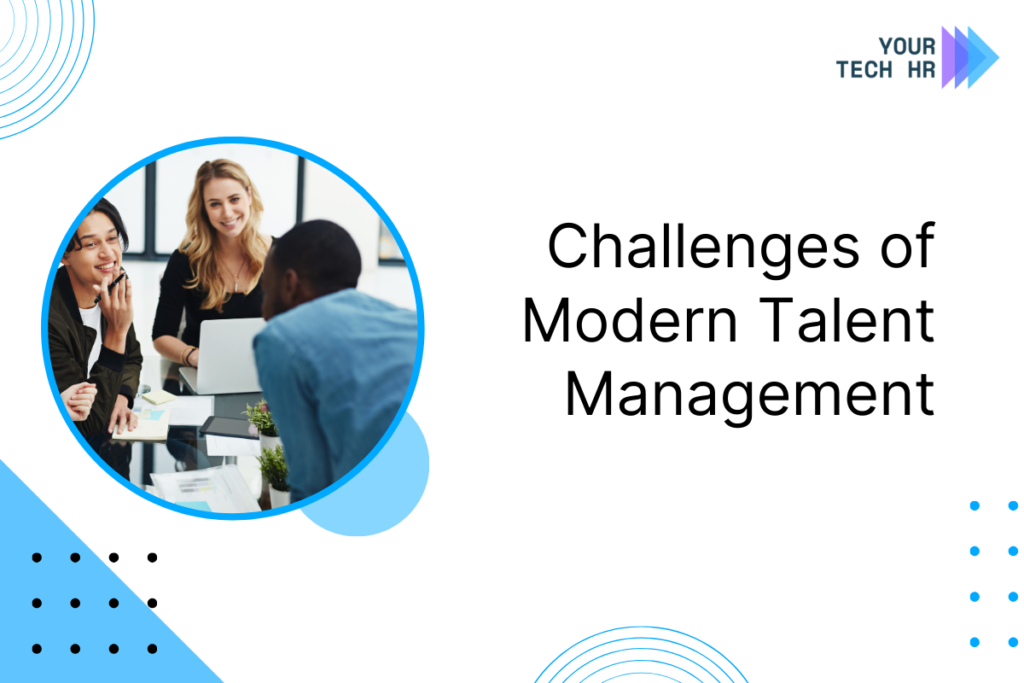In the modern fast changing world of businesses, managing human resources has become an exceedingly intricate task. Organizations are faced with many obstacles when it comes to attracting, retaining and developing skilled professionals as they attempt to respond to the changing dynamics of markets as well as technological advancements. This article delves into the major issues in contemporary HR management such as lack of skills, employee attrition, recruitment and preservation of various talents amidst changes in environment and the use of information technology
1. Skill Gaps
One of the most serious challenges in the field of managing talent is dealing with skill gaps. Since industries are continuously changing and new technologies are being developed, the skills that lead to success also vary constantly. Companies have to recognize and fill in the skill gaps that exist between what their employees currently have and what will be required later on.
Why Skill Gaps Matter:
- Hinders Organizational Performance:
Skill gaps can prevent organizations from achieving their strategic goals and maintaining a competitive edge. - Increases Training Costs:
Bridging skill gaps often requires investing in training and development programs, which can be costly and time-consuming. - Impacts Productivity:
Employees may struggle toperform effectively if they lack the necessary skills, leading to decreased productivity and job satisfaction.
Addressing Skill Gaps:
- Conduct Skills Assessments:
Regularly assess the skills of your workforce to identify gaps and areas for improvement. - Invest in Upskilling and Reskilling:
Develop training programs to help employees acquire new skills and adapt to changing requirements. - Foster a Learning Culture:
Encourage continuous learning and professional development to keep skills current and relevant.
2. Employee Retention
When it comes to holding onto superior employees, one of the greatest difficulties is posed by the cutthroat recruitment. On account of high employee turnover, operations can be interrupted, recruitment prices raised and team spirits messed-up too
Why Employee Retention Matters:
- Reduces Turnover Costs:
High turnover rates can be expensive due to the costs of recruiting, hiring, and training new employees. - Maintains Organizational Knowledge:
Retaining experienced employees helps preserve institutional knowledge and expertise. - Improves Team Morale:
High retention rates contribute to a stable and positive work environment, which enhances team cohesion and productivity.
Strategies for Improving Retention:
- Offer Competitive Compensation:
Ensure that your salary and benefits packages are competitive with industry standards. - Foster Employee Engagement:
Create opportunities for employees to be involved in decision-making and recognize their contributions. - Promote Work-Life Balance:
Implement policies that support flexible working arrangements and employee well-being.
3. Attracting and Retaining Diverse Talent
Innovation and success require diversity, but attracting and keeping diverse employees poses its own hurdles. To cultivate inclusive cultures that respect and support diverse talent, organizations must engage in more than mere diversity antics
Why Diversity Matters:
- Drives Innovation: A diverse workforce brings different perspectives and ideas, which can lead to more creative solutions and improved problem-solving.
- Enhances Reputation: Companies that embrace diversity are often viewed more favorably by customers, partners, and potential employees.
- Improves Performance: Studies have shown that diverse teams tend to outperform homogeneous ones in terms of financial performance and decision-making.
Strategies for Attracting and Retaining Diverse Talent:
- Implement Inclusive Hiring Practices:
Use unbiased recruitment methods and ensure that job descriptions are inclusive and appealing to a diverse audience. - Create an Inclusive Culture:
Foster a workplace environment where all employees feel valued and respected. - Offer Mentoring and Support:
Provide mentorship and support programs to help diverse employees succeed and advance within the organization.
4. Adapting to Change
The rapid pace of technological and economic change presents a significant challenge for talent management. Organizations must be agile and adaptable to stay competitive in a dynamic environment.
Why Adaptability Matters:
- Keeps Pace with Innovation: Adapting to new technologies and market trends is essential for maintaining a competitive edge.
- Ensures Relevant Skills: As job roles and responsibilities evolve, employees need to acquire new skills to remain effective.
- Facilitates Growth: Agility allows organizations to respond quickly to opportunities and challenges, driving growth and success.
Strategies for Adapting to Change:
- Embrace Agile Workforce Planning:
Develop flexible workforce plans that can quickly adjust to changing business needs. - Encourage Continuous Learning:
Promote a culture of lifelong learning to help employees adapt to new skills and technologies. - Leverage Technology: Use advanced tools and platforms to streamline processes and improve organizational agility.
5. Leveraging Data and Technology
Data and technology are essential for effective talent management, but the lack of appropriate tools or data analytics capabilities can pose challenges. Organizations must effectively utilize data to make informed decisions and enhance talent management practices.
Why Data and Technology Matter:
- Improves Decision-Making: Data-driven insights help organizations make better decisions regarding talent acquisition, development, and retention.
- Enhances Efficiency: Technology can streamline HR processes, reducing administrative burdens and improving efficiency.
- Facilitates Personalization: Data allows for more personalized employee experiences and development plans.
Strategies for Leveraging Data and Technology:
- Invest in HR Technology: Implement HR software and analytics tools to streamline processes and gain insights into workforce trends.
- Utilize Data Analytics: Analyze employee data to identify patterns, predict turnover, and develop targeted strategies.
- Ensure Data Security: Protect employee data and comply with relevant regulations to maintain trust and avoid potential issues.
Conclusion
Modern talent management presents numerous challenges, from addressing skill gaps and improving employee retention to attracting and retaining diverse talent and adapting to change. By understanding these challenges and implementing effective strategies, organizations can navigate the complexities of talent management and drive long-term success.
Focus
on continuous learning and development, foster a positive work environment, and leverage technology and data to enhance your talent management practices. Embracing these principles will help you build a resilient and high-performing workforce, ready to meet the demands of a dynamic business landscape.


